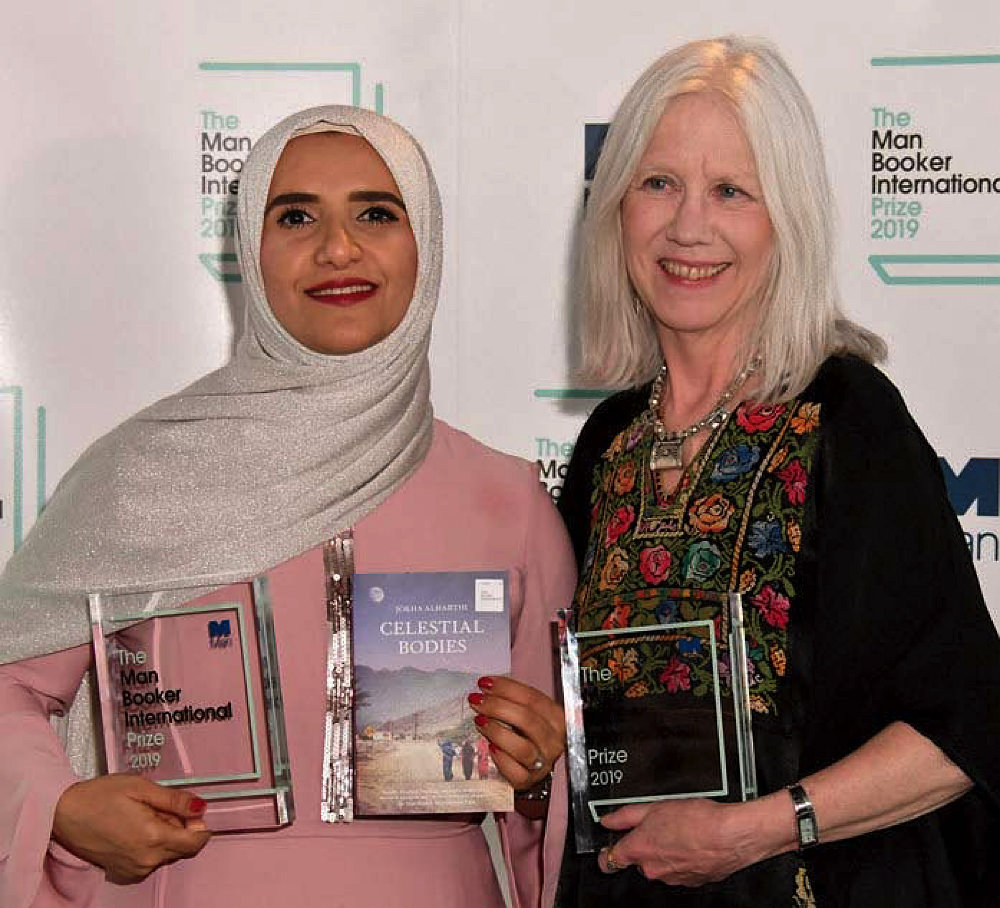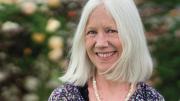Marilyn Booth ’77 is one of the world’s most prolific translators of Arabic fiction into English. For nearly four decades, she has collaborated with writers from across the Arabic-speaking world to introduce dozens of literary works from cultures that many English-speakers otherwise see represented only by foreign correspondents. Recently, Booth translated Omani writer Jokha Alharthi’s Celestial Bodies, which nimbly narrates a set of unhappy marriages; the translation earned praise in The New Yorker from James Wood, professor of the practice of literary criticism: “A beautifully wavering, always mobile set of temporalities, the way starlight seems to flicker.” Celestial Bodies is the first novel by any Omani woman to cross into English, and it won the 2019 Man Booker International Prize. (Booth is now at work on a second novel by Alharthi.)
“I love having translation as my art,” Booth remarks from Magdalen College, Oxford, where she is a professor of the contemporary Arab world. Her research career is prolific—her fourth monograph, on feminism in late-nineteenth-century Egypt, is forthcoming—but translation opens a different kind of creative universe, she says: “Translation is wonderful because somebody else comes up with the plot and the character’s voice, and then I get to play with it.” At the same time, “translation also involves a ton of research to do it right,” she explains. Because the Arabic-speaking world spans so many different countries, each with its own cultural history, she often begins by reading at length about the reality represented in a work of fiction, and about its writer’s lifetime. Then she tries to listen for the voice of the writer and characters—what it sounds like to her in Arabic, and what it might sound like in English. At a certain point, though, she steps back: by the end, “I’ve done my interpretive work and then it’s up to readers to take what they can from the various voices.”
Her most recently published project, Lebanese novelist Hoda Barakat’s Voices of the Lost, offers an array of voices with which to play. The novel begins with the texts of five letters; in each section, a new character finds a previous narrator’s letter by chance in a public place, then mentions it in a new letter of their own. Booth calls it “an incredibly timely novel” partly about the experience of statelessness: the characters’ paths cross in hotels and airports as they move between unnamed countries, fleeing haunting pasts. One letter goes from a young gay man to his father; another from a middle-aged woman to her former lover in Canada; another from a man forced to turn informant during a revolution. In the novel’s second half, each letter receives a reply from its recipient, for a total of 10 distinct voices—a tall task Barakat and Booth together execute with grace. “I think she’s an amazing writer,” Booth says of Barakat. “I just love her language, her work with voice, and her versatility from one novel to the next.”
Booth has worked with Barakat on two previous novels, Disciples of Passion and The Tiller of Waters. The author left Lebanon in the 1980s, during its long civil war, and now lives in Paris, where she has been knighted twice by the French Ministry of Culture and serves as news director for the network Radio Orient, which broadcasts in a mix of French and Arabic. Her literary reputation in France is well established, but is only beginning to break through in the English-speaking world. Booth hopes to translate more of Barakat’s fiction in the future—“but that’s unclear, just because it remains hard to get publishers for translations.”
When Booth first tried translating Arabic literature, “There was absolutely no way that you could turn literary translation in Arabic into a full-time career unless you had other financial resources.” Her first exposure to the language came at age 11, when her family moved from their home in the United States to spend nine months in Lebanon. Her father had left a career as a minister to become a scholar of comparative religion and wanted to learn more about Islam. Though brief, Booth’s experiences that year, meeting people from Lebanon and elsewhere in the Arab world, imprinted on her a deep awareness of culture’s relationship to politics. At first, she planned to become a journalist after college, “because there weren’t many journalists who actually knew Arabic.” She did her earliest translations as a student at Radcliffe while working on a senior thesis in Near Eastern languages and civilizations about the Lebanese-Palestinian writer May Ziadeh. “I got really fascinated by trying to convey her voice,” Booth recalls.
As a Marshall Scholar at Oxford, she continued to draft translations alongside her academic research, and began to publish them around the time she finished her doctorate in Arabic literature and Middle Eastern history. Booth has always considered it crucial to translate women’s writing; one of her earliest projects was Memoirs from the Women’s Prison, by the Egyptian doctor and activist Nawal El Saadawi. “At the time, she was kind of the only Arab female writer that anybody outside of the Arab world knew well,” Booth notes. “With all due respect to her, I wanted other voices to be heard. It was important to me from an early period to try to translate other women; and, as a feminist myself, I cared about getting other feminist voices out.”

Booth won the 2019 Man Booker International Prize with novelist Jokha Alharthi for Celestial Bodies, which follows the losses and loves of three Omani sisters.
Photograph by Nils Jorgensen/Shutterstock
Booth hopes to complicate Anglophone readers’ received notions about the lives of women in the Arab world. “It’s just so frustrating how hard it is, even now, to get the message through here [in the U.K.] and in the U.S. that Muslim women, especially those in the Arab region, are not uniformly oppressed, silent people.” Her academic work has also aimed at fostering a greater appreciation of the lively tradition of women thinking and writing throughout the history of modern Arabic letters. Her books May Her Likes Be Multiplied: Biography and Gender Politics in Egypt and Classes of Ladies of Cloistered Spaces: Writing Feminist History through Biography in Fin-de-Siècle Egypt both call for closer attention to biography as a key expressive and intellectual genre for Egyptian women around the turn of the twentieth century.
“I really would love to translate a nineteenth-century novel that I’ve worked on,” she says—but once again, finding publishers willing to look at any Arabic literature outside the purely contemporary remains difficult. The infrastructure of editing, publishing, grants, and prizes that fuels translation in some other languages is still maturing for Arabic-to-English translators. “We’re not just translators,” Booth points out. “We have to be advocates for the literature, and we have to persuade both publishers and audiences.” Nevertheless, she maintains a sense of purpose: “There’s both political and aesthetic reasons to keep doing this.”









